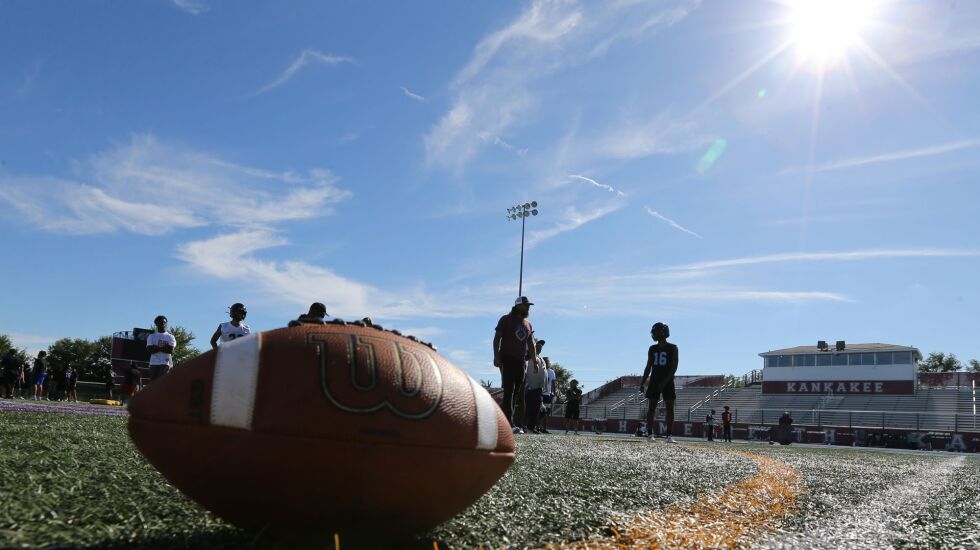
On Monday, thousands of high school football players and student-athletes in other fall sports across Illinois will report for their first practices of the season. It is up to every coach, school administrator and district superintendent to make sure no child becomes a victim of hazing.
It sounds like a no-brainer. No school official or coach wants a child or teen to be hazed or bullied. Yet, it still goes on. The culture of hazing that plagues sports at all levels often starts in high school or middle school.
The disturbing, substantiated claims of hazing in Northwestern University’s football program, and the subsequent lawsuits, are a reminder that hazing can and does happen anywhere — and will end only when coaches fully recognize hazing for what it is: cruel, intentional psychological or physical abuse.
As Susan Lipkins, a psychologist who has studied hazing for 20 years, told us, “Hazing is done in groups with a hierarchy, and they want to maintain the hierarchy based on tradition. They feel they have the right and duty to pass on the ritual.”
Bullying also can be prevalent in sports, when, for instance, an entire team is made to run sprints because of missteps by one or two players; players get ticked off and take revenge against teammates who blundered. Bullying, in contrast to hazing, is spontaneous, Lipkins said. But in either case, it’s a person or group diminishing others.
Sometimes, the actions are overtly racist, as in the case of Black Northwestern players who, their lawsuit alleges, were forced to take part in watermelon-eating contests.
Not too long ago, coaches would chalk up hazing or bullying to “horseplay.” But indifference allows abuse to continue. Left unchecked, it can bring on lifelong trauma.
Former Northwestern football player Ramon Diaz said hazing led him to try to kill himself. He told reporters recently that he was forced to participate in the “car wash,” when naked, older players would line up, covered in soap, and spin around the shower entrance as freshmen were forced to rub against them. Other former players also have filed lawsuits.
In the last several years, allegations of hazing have led to lawsuits against area high schools.
Two years ago, two former freshman football players at Plainfield Central High School filed a lawsuit alleging sexual assault from a violent hazing ritual. That case is ongoing, a spokeswoman for the players’ lawyer, Antonio Romanucci, told us.
In 2018, a former football player at Reed-Custer alleged in a federal lawsuit that he was sexually assaulted in 2017 in a hazing ritual. Attorney John D. Risvold, who represented the player’s family, told us he couldn’t discuss the case because of a confidentiality agreement, except to say “this matter has been resolved to the satisfaction of the parties.”
In 2017, Lake Zurich Community Unit School District 95 settled a lawsuit by two former football players that alleged hazing and sexual assault by teammates.
In 2016, five former Maine West soccer players who alleged they were sexually assaulted in a soccer hazing ritual received a settlement from Maine Township High School District 207.
Take steps against hazing, and be vigilant long-term
On paper, schools have strict policies about hazing and bullying, in accordance with state laws. Schools emphasize rules to start each school year.
This week, Chicago Public League coaches will participate in a seminar that emphasizes a positive team culture and the impact coaches have on student-athletes, a spokesman said in an email. That’s a good start.
Every school district should have an anonymous tip line to report abuse. At Oak Park River Forest High School, for example, instructions to report any safety concerns are on the back of student and employee IDs.
It takes courage to speak up against hazing and bullying. Northwestern’s investigation of its football program began after a player sent an anonymous email to the school. But the onus shouldn’t be solely on the players. It’s up to coaches and administrators to make sure there are no harmful incidents at practices, in locker rooms or on buses to games. Locker rooms must be monitored at all times in a way that doesn’t compromise students’ privacy.
Coaches are parental figures for many student-athletes, Lipkins noted. They wield great influence over a team. When it comes to hazing, “if that coach is using their power and is firm … if they send a message clearly and consistently, it’s less likely to happen.”
Sports seasons go on for months; it’s easy for coaches and school administrations to become complacent. “There’s supposed to be zero tolerance when it comes to hazing,” Romanucci, who has represented the families of high school victims, said. “There’s not 100% enforcement.”
In the wake of the Northwestern scandal, “there will be great oversight,” Romanucci said. “Now, would you please do this year after year, decade after decade, so we don’t keep revisiting the same problem over and over again?”
Vigilance is a must, indeed.
The Sun-Times welcomes letters to the editor and op-eds. See our guidelines.







